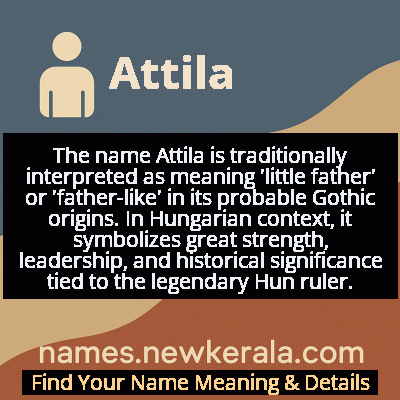Attila Name Meaning & Details
Origin, Popularity, Numerology Analysis & Name Meaning of Attila
Discover the origin, meaning, and cultural significance of the name ATTILA. Delve into its historical roots and explore the lasting impact it has had on communities and traditions.
Name
Attila
Gender
Male
Origin
Hungarian
Lucky Number
9
Meaning of the Name - Attila
The name Attila is traditionally interpreted as meaning 'little father' or 'father-like' in its probable Gothic origins. In Hungarian context, it symbolizes great strength, leadership, and historical significance tied to the legendary Hun ruler.
Attila - Complete Numerology Analysis
Your Numerology Number
Based on Pythagorean Numerology System
Ruling Planet
Mars
Positive Nature
Generous, passionate, energetic, and humanitarian.
Negative Traits
Impulsive, impatient, moody, and can be overly emotional.
Lucky Colours
Red, maroon, scarlet.
Lucky Days
Tuesday.
Lucky Stones
Red coral, garnet.
Harmony Numbers
1, 2, 3, 6.
Best Suited Professions
Military, sports, philanthropy, leadership roles.
What People Like About You
Courage, energy, leadership, generosity.
Famous People Named Attila
Attila the Hun
Ruler and Military Leader
Led the Hunnic Empire and became one of the most feared enemies of the Roman Empire
Attila József
Poet
One of Hungary's most famous and influential modernist poets
Attila Ambrus
Former Hockey Player/Bank Robber
Known as the 'Whiskey Robber', became a folk hero in Hungary for his daring bank heists
Attila the Stockbroker
Performance Poet/Musician
British punk poet and musician known for his political and satirical performances
Name Variations & International Equivalents
Click on blue names to explore their detailed meanings. Gray names with will be available soon.
Cultural & Historical Significance
The cultural significance extends beyond Hungary to Turkic peoples who claim descent from the Huns, where Attila represents a glorious ancestral heritage. In Western literature and art, the name has been used as shorthand for barbaric destruction and the collapse of civilization, appearing in works from medieval chronicles to modern films. This dual interpretation - destroyer versus national hero - makes Attila one of the most culturally charged names in European history, representing the tension between civilization and the 'barbarian' other throughout Western historical consciousness.
Extended Personality Analysis
Individuals named Attila are often perceived as possessing strong leadership qualities, determination, and an intense, commanding presence. They tend to be ambitious, confident, and unafraid to take charge in challenging situations, reflecting the historical namesake's reputation as a formidable leader. However, this strong exterior often conceals a more complex personality - many Attilas develop a protective nature toward those they care about and can demonstrate surprising loyalty and strategic thinking. The name carries expectations of strength and resilience, which often shapes the bearer's self-perception and how others interact with them, creating a self-fulfilling prophecy of leadership and determination.
Beyond the obvious associations with power and authority, those named Attila frequently exhibit keen strategic minds and the ability to assess situations with remarkable clarity. They often possess a natural charisma that draws followers and commands respect, though they may struggle with the weight of expectations that come with such a historically loaded name. Many develop a dry wit or intellectual depth as a counterbalance to the name's aggressive connotations. The psychological impact of bearing this name cannot be overstated - it creates both opportunities for leadership and challenges in personal relationships, as others may project their assumptions about the name's historical significance onto the individual.
Modern Usage & Popularity
In contemporary times, Attila remains a popular masculine name in Hungary and among Hungarian communities worldwide, though its usage has become more selective due to the strong historical connotations. The name experienced a resurgence in Hungary during the 19th century national revival movement and continues to be chosen by parents seeking a name that embodies strength and cultural heritage. Outside Hungary, the name is less common but appears in Turkey and other Central Asian countries, often stripped of its Western 'barbarian' associations. Modern bearers of the name frequently navigate the balance between its powerful, commanding sound and the historical baggage it carries in Western consciousness. Recent decades have seen a slight decline in usage as parents opt for less historically charged names, though it maintains a steady presence particularly in rural areas and among families with strong nationalist sentiments.
Symbolic & Spiritual Meanings
Symbolically, Attila represents raw power, unconquerable will, and the force of nature itself. The name evokes images of unstoppable momentum, like a storm or earthquake that cannot be controlled or reasoned with. In metaphorical terms, it symbolizes the breaking of established orders and the triumph of primal strength over civilized sophistication. The name also carries connotations of freedom from constraint and the courage to challenge overwhelming odds. In psychological symbolism, Attila represents the shadow self - the untamed, aggressive aspects of human nature that civilization seeks to suppress but which remain essential sources of vitality and determination. The symbolic meaning extends to represent cultural resilience and the enduring spirit of peoples who maintain their identity against assimilation pressures.

